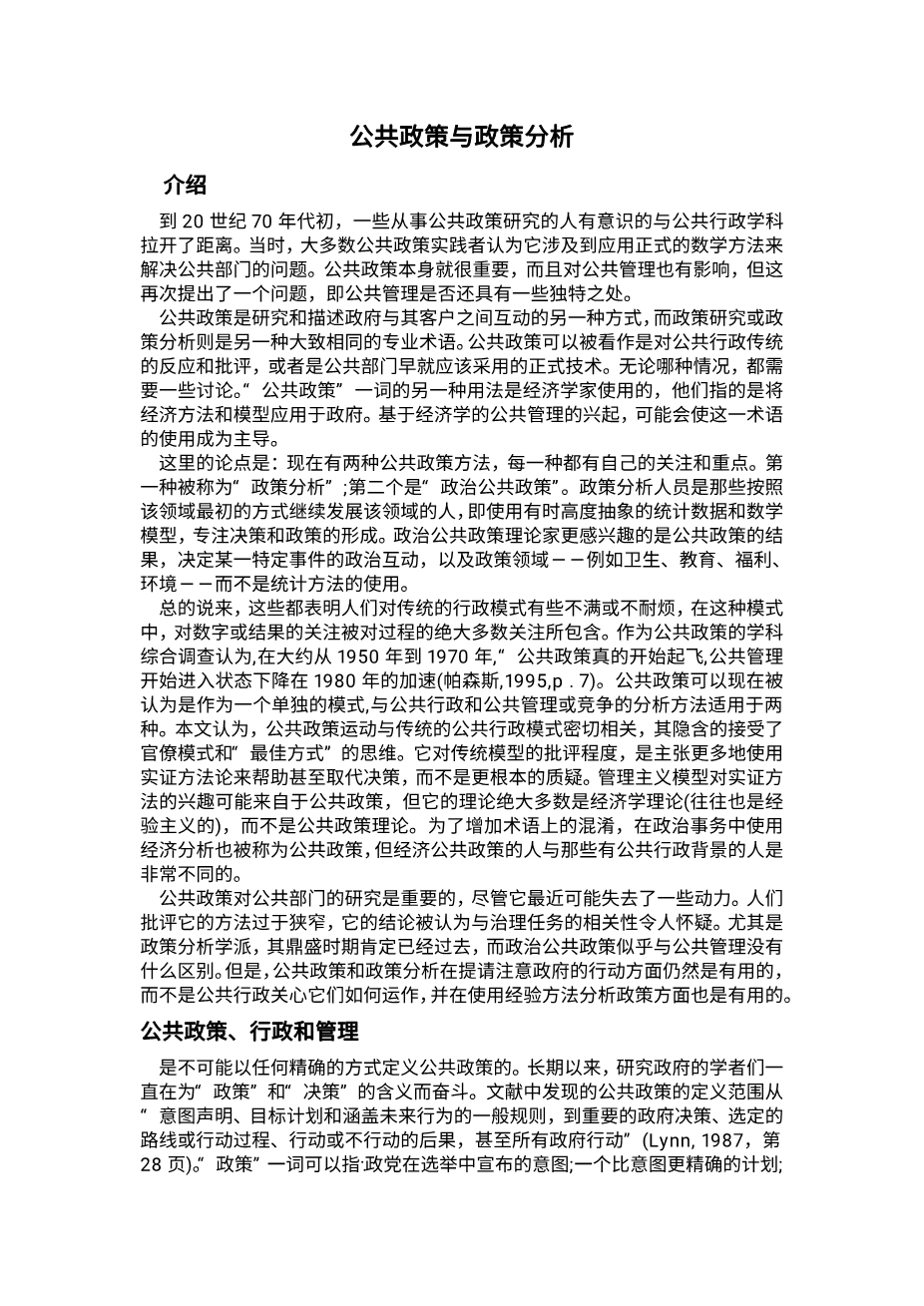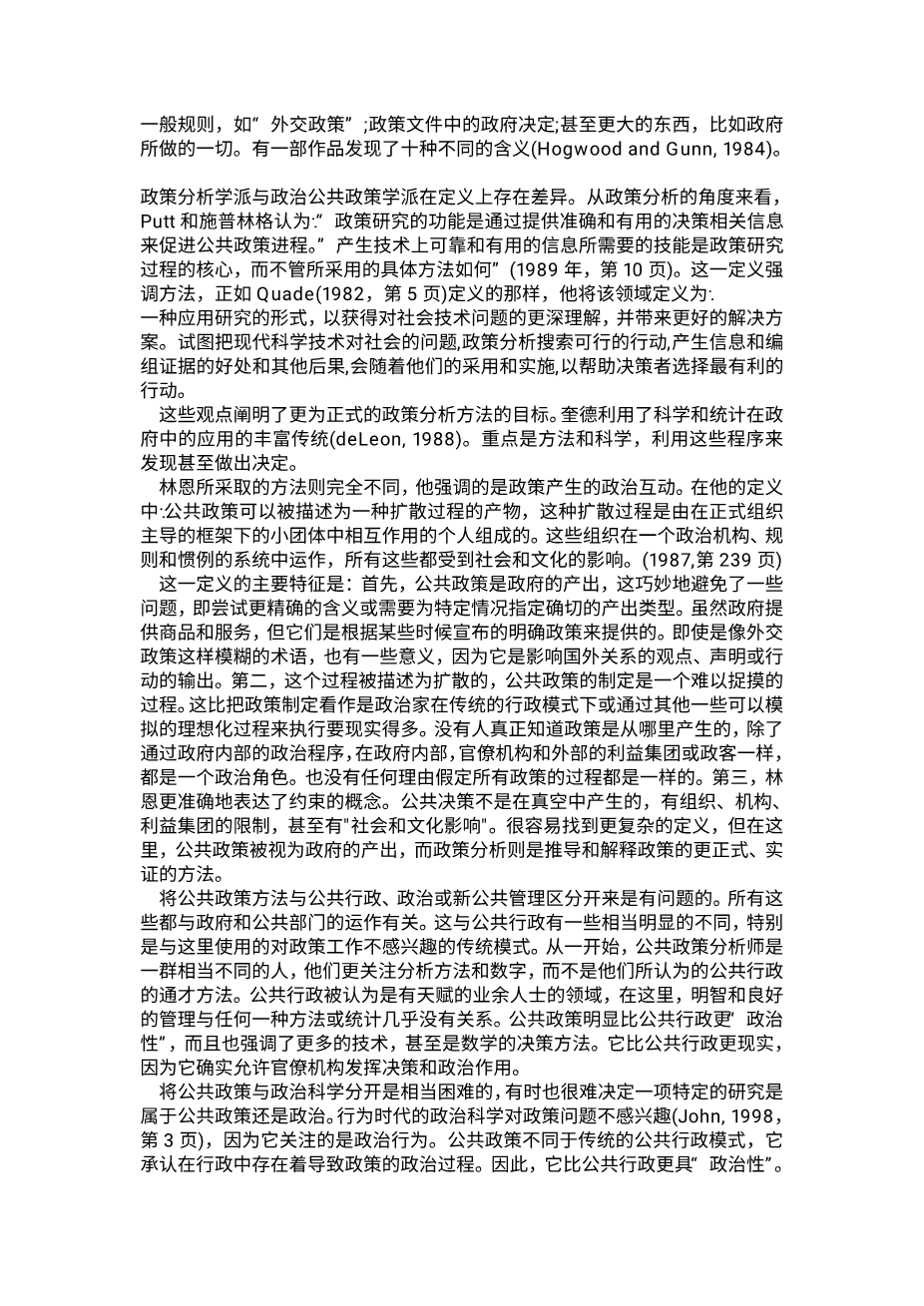Public Policy and Policy Analysis
Introduction
By the early 1970s, some involved in the study of public policy consciously and deliberately distanced themselves from the discipline of public administration. Most public policy practitioners at the time saw it as concerned with the application of formal, mathematical methods to solving public sector problems. Public policy is important in its own right and as an influence on public management, but again raises the question as to whether there is still something distinctive about public administration.
Public policy is yet another way of studying and characterizing the interaction between government and its clients, while policy research or policy analysis are other terms for much the same thing. Public policy could be seen as a reaction to and critique of the public administration tradition or as the long overdue adoption of formal techniques by the public sector. In either case, it needs some discussion. Another usage of the term public policy is that used by economists, by which they mean the application of economic methods and models to government. It is possible that the rise of a public management based on economics will see this usage of the term become predominant.
The argument here is that there are now two public policy approaches, each with its own concerns and emphases. The first is termed policy analysis; the second, political public policy. The policy analysis people are those who have continued to develop the field in the way it started, that is, by the use of sometimes highly abstract statistics and mathematical models, with the focus on decision-making and policy formation. Political public policy theorists are more interested in the results or outcomes of public policy, the political interactions determining a particular event, and in policy areas - health, education, welfare, the environment, for example - rather than in the use of statistical methods.
Together, these point to some dissatisfaction or impatience with the traditional model of administration, where a concern either for numbers or for outcomes was subsumed by the overwhelming concern with process. As a comprehensive survey on the discipline of public policy argues, in the period roughly from tin 1950s to the 1970s, public policy really began to take off, and public administration began to move into a state of decline which was to accelerate in the 1980s (Parsons, 1995, p. 7). Public policy could now be considered either as a separate paradigm, competing with public administration and public management or as a set of analytical methods applicable to both. It is argued here that the public policy movement is closely related to the traditional model of public administration, with its implicit acceptance of the bureaucratic model and its one best way thinking. The extent of its critique of the traditional model was to argue for more usage of empirical methodology to assist or even supplant decision-making, rather than more fundamental questioning. The managerialist model may derive its interest in empirical methods from public policy, but its theories are overwhelmingly those of economics - again often empirical - rather than of public policy. To add to the terminological confusion the use of economic analysis in political matters is also called public policy, but economic public policy people are very different from those with a public administration background.
The public policy movement is important to the study of the public sector even though it may have lost some impetus recently. Its methods have been criticized for being too narrow and its conclusions are seen as of dubious relevance to the task of governing. The policy analysis school in particular has certainly passed its peak while political public policy seems indistinguishable from public management. However, public policy and policy analysis remain useful in bringing attention to what governments do, as opposed to the public administration concern with how they operate, and in using empirical methods to analyse policy.
Public policy, administration and management
It is not possible to define public policy in any precise way. Students of government have long struggled over what is meant by lsquo;policyrsquo; and lsquo;policy-makingrsquo;. Definitions of public policy found in the literature range from declarations of intent, a programme of goals, and general rules covering future behavior to important government decisions, a selected line or course of action, the consequences of action or inaction, and even all government action (Lynn, 1987, p. 28). The word policy could refer to: the intentions declared by parties in an election; a rather more precise programme than an intention; general rules such as foreign policy; government decisions in a policy document; and to even larger things such as everything the government does. One work finds ten separate meanings (Hogwood and Gunn, 1984).
There are differences in definition between the policy analysis and political public policy schools. From a policy analysis perspective, Putt and Springer argue: The function of policy research is to facilitate public policy processes through providing accurate and useful decision-related information. The skill required to produce information that is technically sound and useful lie at the heart of the policy research process, regardless of the specific methodology employed (1989, p. 10). This definition emphasizes methods, as does Quade (1982, p. 5) who defines the area as:
A form of applied research carried out to acquire a deeper understanding of socio-technical issues and to bring about better solutions. Attempting to bring modem science and technology to bear on societys problems, policy analysis searches for feasible courses of action, generating information and marshalling evidence of the benefits and other consequences that woul
剩余内容已隐藏,支付完成后下载完整资料


英语译文共 3 页,剩余内容已隐藏,支付完成后下载完整资料
资料编号:[264274],资料为PDF文档或Word文档,PDF文档可免费转换为Word
以上是毕业论文外文翻译,课题毕业论文、任务书、文献综述、开题报告、程序设计、图纸设计等资料可联系客服协助查找。
您可能感兴趣的文章
- 通过在消费者心中树立品牌关系导向来提高酒店品牌绩效外文翻译资料
- “友好“抱怨行为:走向亲密的手段外文翻译资料
- 服务蓝图:针对关键服务流程的有效方法-在四星级国际酒店Arash Shahin 管理部进行案例研究外文翻译资料
- 组织中女性高管职业生涯规划与晋升的视角:连锁性别偏见的经验,双重束缚,和不成文的晋升规则外文翻译资料
- 影响优秀员工工作满意度的激励因素识别外文翻译资料
- 探索离职意向的影响因素:以豪华酒店员工为例外文翻译资料
- 新冠肺炎疫情下,中国酒店旅游业面临的挑战与机遇外文翻译资料
- 酒店Twitter账号的营销效果:以沙特阿拉伯为例外文翻译资料
- 酒店旅游市场营销外文翻译资料
- 中国经济型酒店SWOT分析外文翻译资料


